If I said to you The Long Walk is a good film—for boomer fascist fantasy torture porn, would you forget the first part of the sentence by the time you got to the end?
I’ve been thinking a lot these days about what I call “The Buy-In”. The Buy-In is the hurdle an artist has to get over to get the audience to “buy in” to the story. All narrative forms of art have this. (It’s true of all forms art, really, but for now we’re talking narratives.)
For example, I exchanged tweets with a guy a few weeks back where he trashed Weapons, and his review contained something to the effect of how he basically couldn’t buy supernatural elements. Not just Weapons supernatural elements, but any supernatural elements.
No buy-in.
As a big fan of “Mystery Science Theater 3000”, “Rifftrax” and “372 Pages We’ll Never Get Back,” and of riffing on movies before those things existed, I can affirm that an entire class of jokes exists solely on refusing to buy-in. (And the degree to which a person will find that funny? Also a matter of buying in to the meta-commentary premise!)
Why all the throat clearing before getting to the review?
Because The Long Walk is a pretty good movie that slaps you in the face with dumb and basically dares you to keep buying in.
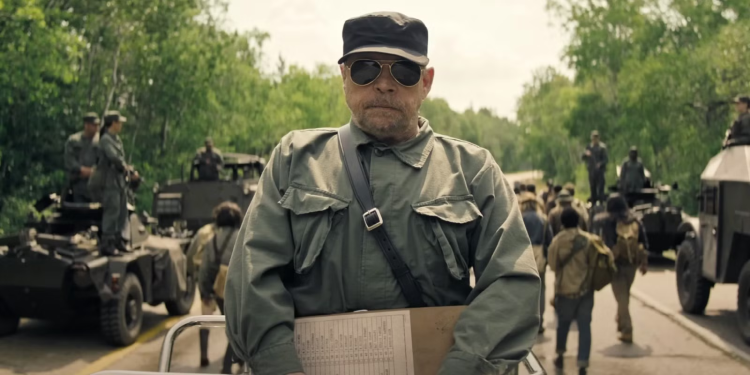
“You pukes think you can handle ONE HOUR and FORTY-EIGHT MINUTES of this level of dumb? You don’t look like you have the testicular fortitude to handle a “Big Bang Theory” mini-marathon!”
What’s It All About, Stevie?
The premise is that in an alt-history USA—from the look of things sometime in the early ’60s, but more on that in a second—had a war and is on hard financial times, and also fascist. And they’ve decided to remedy these hard financial times by having a bunch of people walk a long distance, murdering them as they go. (Step 3: Profit!)
So, The Running Man but slower. And with no glitz. Or spandex. Or any of the fun, campy stuff of the ’80s movie.
Every year, there’s a lottery. Fifty men are chosen to do the walk. They must walk at a minimum of 3mph, or they get a warning. After three warnings, their armed escort will shoot them. The last survivor is given all the money and a wish. (An addition from the screenwriters—even Stephen King wouldn’t do something as a dumb as “you get a wish”. OK, I take that back, he totally would, but he didn’t think of it.)
Our opening scene has the protagonist, Garraty (played by Philip Seymour Hoffman’s son, Cooper Hoffman) bidding farewell to his tearful mother (Jane Greer), in a scene that makes it clear that the walk is voluntary and that Something Bad happened to Papa Garraty.
We have a lot of questions at this point, and those questions are answered by The Major, who is played by Mark Hamill. The last Stephen King movie we saw, The Life of Chuck, also featured Hamill as an old (Jewish?) grandfather and it was the best role I’d ever seen him do.
This is possibly the worst role I’ve ever seen him do, though it’s not really his fault. The Major is Stephen King’s idea of what an American caudillo would be like, and he’s so cartoonishly dumb, he knocks you out of the movie every time you see him. (I believe King wrote this story initially in the ’60s, and it has that kind of groovy, anti-American feel, even though the scriptwriter obviously changed plenty of elements of the story.)
[This is going to be a spoiler-y review, but I assure you, there are no surprises in this film, unless maybe you read the novel and expect it to hew to that strictly.]
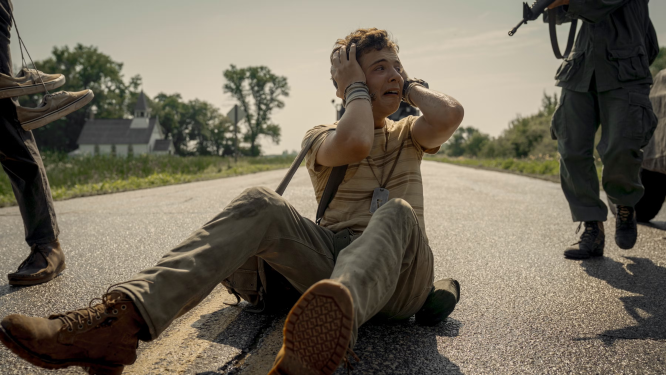
“Wait! I could get shot here? This is the first I’m hearing!”
Here Be Spoilers
OK, I’m willing to buy into the nonsense, even though the movie is already defeating its own premise, as members of this long walk start by flipping off cops. At a later point, one of the characters holds up a radio playing, presumably, rebellious music to raise morale, and the viewer is left to wonder what sort of fascist state this is that allows open defiance to the extent of radio stations being allowed to play, I don’t know, rock ‘n’ roll or whatever. (This, and all the in-narrative music is disastrous. Obviously there’s an attempt to recreate the Mozart record scene in Shawshank or any number of anti-authority music scenes in other films, but it’s all cringe.)
One of the characters is writing a book about the walk, because that will “sell big,” meaning there’s some sort of publishing industry that one can get into, and be successful in. But of course, he also has to win the walk, ’cause otherwise he’s dead. And if he wins, he wouldn’t need the money from a book.
So, you have this dubious vehicle through which you can explore peoples’ stories, but every time you start buying in, dumb things happen, which then draw your attention to the ongoing dumb things.
Like, they all have backpacks. But they can also call for food and water at any time. Why would you carry any freakin’ thing? You wouldn’t. On the first day, you’d throw it off, or it would end up abrading your skin away.
Ask me how I know. In fact, my lifelong experience with walking made me wonder if Stephen King or anyone in the film had ever walked before*. Like, I will, on a lark, get up and walk five miles carrying a backpack weighing 40 pounds or more. When I go to BasedCon in Grand Rapids, I walk the three miles to the hotel with a backpack and a bag of books.
I will often do these things without wearing shoes. I don’t prepare, I don’t hydrate, I don’t carry snacks. I’ve done it since I was a kid, walking miles through 100 degree heat, and not wearing shoes.
My life was not at stake, however. Had it been at stake—if, in fact, I had a choice of walking to the utmost of my ability or dying, I would have prepared.
I mention this because, despite the stakes, nobody in this movie is acting like they’re about to die—and it’s a statistical certainty that they are.
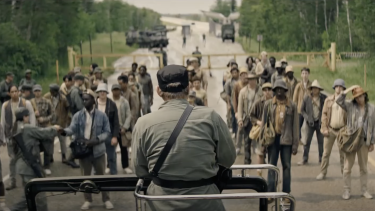
“Look to your left. Now, look to your right. Now, look all around you. All of you are going to die.”
98% Dumb
The Major exists as comic relief here, giving speeches that a college-age hippie thinks a military leader in a police state would give, and you could see this as a grueling training event to promote camaraderie, except that instead of building teamwork through a grueling adventure, they’re just gonna murder everyone. On live TV. And it’s going to—I’m not making this up—boost the GDP.
Then the walk begins and people drop out almost immediately. The kid—I mean, he’s war movie cliché #1 “The Kid” so you know he’s gotta die first—gets a Charley horse, and he’s out. And by out I mean we’re treated to a close-up of his head being blown-off by a soldier in the escort.
’cause, like, that’s real man.
Somebody’s gotta tell these Boomers that Vietnam is over, and the Asians are all going capitalist now because socialism is for dunces.
Actually, I shouldn’t blame Boomers. Director Francis Lawrence (of The Hunger Games, which this is very evocative of) and writer JT Mollner (who wrote and directed last year’s terrific Strange Darling) are both Xers. I don’t know, maybe this is all supposed to be ironic.
Oh, the word “ironic” is used to describe something that’s not even slightly “ironic”. Alanna Morissette, what has thou wrought?
Anyway, it’s the first of many gory scenes which struck me as porn for people who fantasize about America turning into a right-wing fascist state. Like, I’m trying to enjoy the drama about these 50 guys who are acting like they’re not about to die, and the movie’s, like, “Hey, no, this is serious.” (One guy gets his legs run over by a half-track which is a Vietnam war movie trope.)
Anyway, the kid, “Curly” (and I am not making that up) is just the first of many to die within the first few hours of the walk. (The Boy and I saw this right before we did our seven-hour walk at Knott’s, amusingly enough.)
Things settle down a bit and we get some drama between the characters, some backstory, some motivation, and we learn things like everyone volunteers to be in the walk lottery because it’s the only way to succeed in life.
Everyone volunteers, but apparently only two of the fifty actually prepare for it. One of them is a nerdy Asian dude who—
Diversity Is Our What Now?
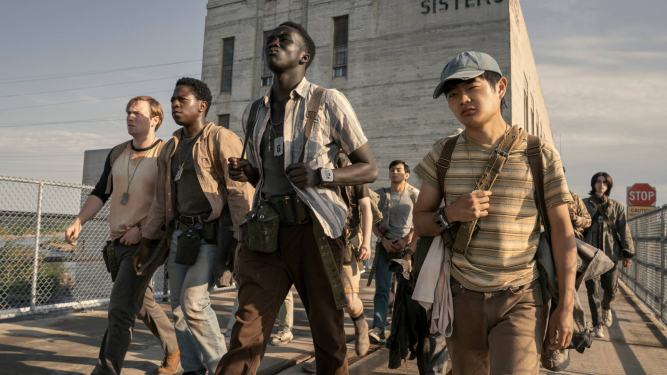
One wonders what conditions led to the ’50s-era fascist government of the USA passing the Immigration and Nationality Act of 1965 which resulted in all this diversity!
Wait, a brief interlude: This is the second movie based on a Stephen King story (after Life of Chuck) where we have a United Colors of Benetton cast and…it’s just fine. Like, the acting is good, nobody brings up race, and everybody gets to have a human story. I generally approve, except that it 1) it’s dumb like the new Star Wars movies having a diverse Evil Empire; 2) it resulted in an amusingly awkward Stephen King trope; 3) it meant I knew the ending well in advance.
Ironically—I think this genuinely is ironic—the original story is just white dudes and the alterations they made not only added persons of color, it made the main black guy into a magical negro. Seriously, McVries (David Jonsson) is the only one among them who has no noticeable issues the whole walk, although he says he had “jelly legs” when another walker complains of them, and he’s constantly saving the protagonist Garraty (Cooper Hoffman).
When I recognized the pattern, I realized how the ending had to go.
We’re getting backstory as we walk, and this is the best part of the movie: You see camaraderie and humanity in a way that possibly makes slightly more sense than The Hunger Games, and you’re rooting for them even though the story has told you right up front that they’re going to die.
Then we get Garraty’s backstory and, well, we literally laughed. Turns out, he’s in the walk because The Major personally came to his house and murdered his father for saying the wrong thing.
Buckle Up: It’s Gonna Get Sillier
This is some quality fascism here. We could estimate the population of the USA during this fantasy time period as being between 100 and 200 million. There’s no Internet, obviously. Hell, there’s not even FM radio from what I can tell. The highest tech is a digital watch that measures speed.
But The Major takes time out to personally go kill Papa Garraty. And why? Because he talks about “the old ways” and reads Nietzsche, Kierkegaard and Camus.
Now, look, we’re supposed to buy in to the fascist America fantasy and I was doing my best, and then this happened.
I appreciate the problem here. You can’t say he read Das Kapital because some people are gonna say “Well, I guess he had it coming” and also you agree with Marx, at least for career purposes. And you can’t say The Bible, because your producers aren’t gonna like that, even though it maps pretty neatly to actual world events We Don’t Talk About.
Anyway, all Papa has to do to get out of it is take a loyalty oath. But, no, he opts for death.
And so we discover that Garraty’s big plan is, when he gets to the end of the walk, for his wish he’s going to ask for a carbine, and then he’s gonna shoot The Major with it.
Once again, I am not making this up.
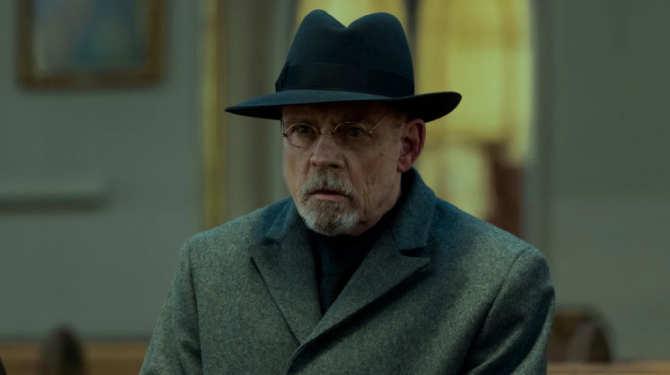
“I will come to your house and personally kill you. That’s the Hamill promise!” (Picture not from the movie, but there are no non-boring pictures of this movie.)
There Are Dozens Of Us! Dozens!
The Killed-For-Camus thing raised another issue: Who is this movie for? Besides referencing some philosophers few people have read, there are a couple of songs. What songs? Well, Garraty’s mother (Jane Greer) sings “Molly Malone” and the troop rouses around a chorus of “My Darling Clementine”.
Finger. On the pulse. (This movie has made $20M now, and I think everyone involved owes the marketing department lunch. And at a nice place, like Jerry’s, not some Chili’s crap.)
Well, we get some good drama and find out McVries’ backstory, and he’s just in the race because he…I don’t know, wanted to go for a walk or something…his motivation is mystical, like he wanted to do it to help out Garraty (whom he of course had never met). He just plans to stop walking at some point.
There are a couple of villains, which you know instantly because they’re blond white guys. (Amusingly, this isn’t really on King because everyone is white in the novel.) One is literally psychotic and takes out the gay guy through provocation.
I mean, he doesn’t say he’s the gay guy but he’s very “gay coded” as the kids say, and the psychotic kid has a southern drawl sometimes, so you know he’s about as evil as he can be. (The Major occasionally has a drawl, too.)
Southern kid provokes gay kid, who takes a swing at him, because you know it’s not like you’re going to die if you slow down. Southern kid ends up being ostracized and wracked with guilt and also hitting himself like someone just off his meds.
(This whole bit was a major disappointment since the Southern kid gets ostracized right off the bat for saying “mee-maw”. Instead of bonding with everyone else, he just gets increasingly alienated. Hacky.)
Pooperation
As the walk wears on, you just can’t help but notice how much it seems like these guys were just kidnapped and dumped on Route 1. For example, there is extensive pooping, including near fatal and fatal pooping. (And we get to see it all, in living color, because it’s real man.)
Because if you knew you were going on a six-day walk, it’s not like you’d give yourself an enema beforehand. You’d just hold on to that stuff knowing you’d be risking your life later on.
Garraty’s shoes give out on day six. Because there wouldn’t be a whole industry devoted to making shoes that would last six days. Not just shoes, but foot wrappings so your feet didn’t get irritated. (Normal socks will do that after a while.)
There’d be training camps, there’d be equipment, there’d be folk wisdom, there’d be cottage industries built around it. But we have to have everyone be dumb victims.
It’s really an awful slander of America and Americans. People are better prepared for “Jeopardy” than this.
As they walk along, their armed escort gets increasingly bored and as quick as you can say “When I world build, I don’t really think things through”, the walkers grab at the guns. The only one who gets away with it, though, is a guy acting completely bonkers at the end of the race whom the soldiers are ignoring, I guess because they have to divide their attention between all six of the remaining walkers. (That’s sarcasm!)
When he gets the gun, he shoots the guy who was holding it, but not the guy on top of the mobile gun who’s five feet from him and armed. Instead he, I dunno, whoops or something.
Plot Twist(s)
The big plot twist—I think it’s supposed to be a plot twist, anyway—is that the other blond kid is the son of The Major. This is shown in the opening sequence, but not spelled out, and The Boy missed it so maybe it’s just ’cause I’m old that it was plain as day. And—this is from the book—the idea is that he’s “the rabbit”.
They’re the dogs at a race track and he’s the rabbit. Well, he’s never in the front, and he’s not a robot, and his only thing is that he’s slightly more knowledgeable about the walk but not in any meaningful way that impacts anything.
Also, he wears a neckerchief. You know what you wouldn’t wear on a 300 mile walk? A neckerchief, or any other garment that might chafe.
In the end, McVries saves Garraty one last time, but then Garraty goes down and gives McVries the win. (Like they would have a black man sacrifice himself for a white man in 2025.)
McVries then wishes for a carbine. The Major insists a guard give it to him and McVries shoots him. (And walks off into the rain unimpeded.)
Other Than That, Mrs. Lincoln…
So, so dumb. But otherwise, a good movie.
The acting is good. Some of the dialogue is poorly articulated which would’ve bothered me more if I thought it mattered. Hoffman is the son of the late Seymour Philip Hoffman and he’s good, but he’s sorta doughy in the way of his dad, and I gotta say, by day six he hasn’t lost a bit of weight. (The Boy’s theory is that they didn’t want to make the walkers look as crappy as they really would.)
A couple of the shots are chaotically edited in a way that didn’t work for me. Opening music sounds like it could’ve been from The Life of Chuck, interestingly, but the composer is primarily known for The Hunger Games.
I didn’t regret watching it, but the dumbness kept coming back at me for the rest of the night, and I was at the Knott’s Halloween Haunt. The Boy started laughing because I’d start a sentence with “Another thing about that walking movie…”
These guys can do better, and I hope they do in the future.
* Of course, Stephen King was famously walking when he got hit by a car, so I guess he has some experience.
